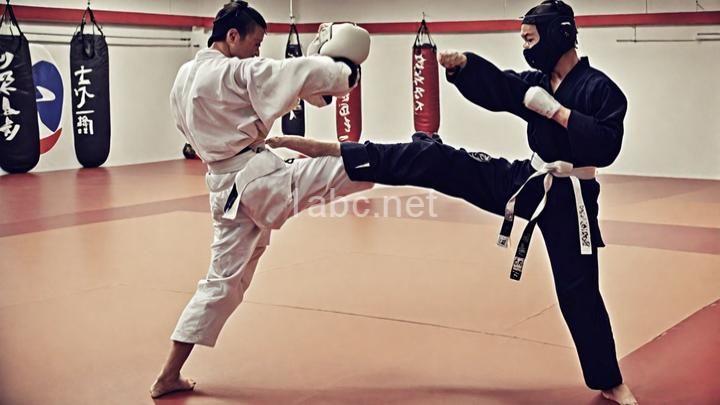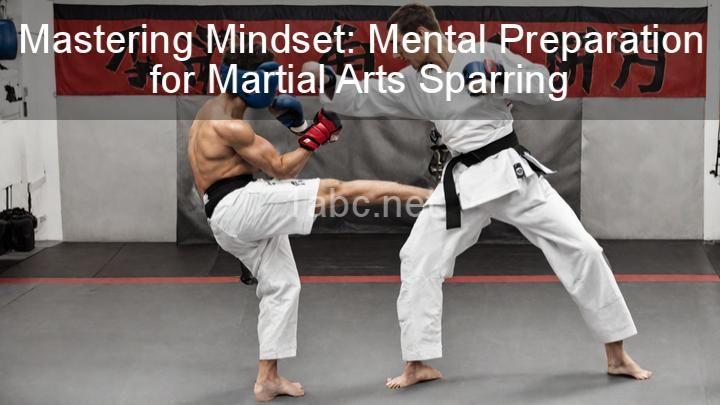Beyond the Physical: Developing Mental Resilience in Martial Arts Sparring

Introduction:
Hey there, fellow martial arts enthusiasts! Welcome to another exciting blog post by dorenelashay9177. Today, we're going to dive deep into the world of martial arts sparring and explore a topic that often goes unnoticed - mental resilience. So grab your gi, strap on your gloves, and get ready to discover how developing mental resilience can take your sparring skills to new heights!
Now, let me share a personal anecdote. I remember the first time I stepped into the sparring ring. My heart was racing, my palms were sweaty, and my mind was filled with self-doubt. It was more than just physical strength and technique that I needed to rely on; it was mental resilience that would see me through the challenges that lay ahead.
I. Understanding Mental Resilience
To truly understand the importance of mental resilience in martial arts sparring, we first need to define what it means. Mental resilience is the ability to adapt, bounce back, and maintain composure in the face of adversity. In the context of sparring, it refers to staying calm, focused, and confident even when faced with intense physical and mental pressure.
While physical strength and technique are crucial, mental resilience takes your sparring game to a whole new level. It allows you to stay in control of your emotions, make split-second decisions, and overcome obstacles that may arise during a sparring session.
Think about it - sparring is not just about landing punches and kicks; it's about reading your opponent, strategizing your moves, and staying one step ahead. Mental resilience enables you to stay sharp, adapt to changing circumstances, and make the most of every sparring opportunity.
II. Building Mental Resilience
Now that we understand the significance of mental resilience in martial arts sparring, let's explore some practical ways to develop and strengthen this invaluable trait.
A. Mindset and Focus
One of the first steps in building mental resilience is cultivating the right mindset. It's important to approach every sparring session with a positive and determined attitude. Believe in yourself and your abilities, and don't let self-doubt creep in.
Maintaining focus during sparring is also key. Avoid distractions and stay in the present moment. Focus on your opponent's movements, anticipate their actions, and react accordingly. By honing your mental focus, you'll be able to make quick decisions and execute your techniques with precision.
Remember, a positive mindset and unwavering focus can make all the difference in the ring.
B. Breathing Techniques and Relaxation
Proper breathing techniques play a vital role in enhancing mental resilience during sparring. Deep, controlled breaths not only provide oxygen to your muscles but also help calm your mind and regulate your heart rate.
Try this simple breathing exercise: Inhale deeply through your nose for a count of four, hold your breath for a count of four, and then exhale slowly through your mouth for a count of four. Repeat this cycle a few times before and during sparring to maintain a calm and focused state of mind.
In addition to breathing techniques, incorporating relaxation exercises into your routine can further enhance your mental resilience. Find techniques that work for you, such as progressive muscle relaxation or guided meditation, and use them to calm your mind and body before and after sparring sessions.
C. Visualization and Mental Imagery
Visualization is a powerful tool that can significantly improve your mental resilience in sparring. By vividly imagining yourself executing techniques, reacting to your opponent's moves, and achieving success, you train your mind to handle real-life situations with greater ease and confidence.
During your training sessions, take a moment to close your eyes and visualize yourself stepping into the sparring ring. Picture yourself evading strikes, landing powerful blows, and triumphing over your opponent. Feel the rush of adrenaline and the satisfaction of a job well done. By repeatedly visualizing these scenarios, you'll build mental resilience and boost your confidence in the ring.
Don't just take my word for it - there have been numerous success stories and research studies that support the effectiveness of visualization techniques. Athletes across various sports, including martial arts, have credited visualization for their improved performance and mental resilience.
III. Overcoming Challenges and Setbacks
In martial arts sparring, setbacks are inevitable. It's how you handle these challenges that defines your mental resilience. When faced with setbacks, it's important to stay persistent and maintain a growth mindset.
Instead of getting discouraged, view setbacks as learning opportunities. Analyze what went wrong, seek feedback from your coaches or teammates, and adapt your approach. Embrace the process of learning and growing, knowing that each setback brings you one step closer to becoming a mentally resilient martial artist.
Remember, mental resilience is not built overnight. It requires consistent effort, practice, and a willingness to face and overcome challenges head-on. Embrace the journey and trust in your ability to develop the mental fortitude needed for sparring success.
Conclusion:
Congratulations, my fellow martial arts enthusiasts, you've made it to the end of this blog post! We've explored the world of mental resilience in martial arts sparring and discovered how it goes beyond physical strength and technique. By developing mental resilience, you'll be able to stay calm, focused, and confident in the face of adversity.
We've discussed the importance of mindset and focus, the benefits of breathing techniques and relaxation, and the power of visualization and mental imagery. We've also touched on overcoming challenges and setbacks, emphasizing the importance of persistence and a growth mindset.
So, as you continue your martial arts journey, remember to prioritize your mental resilience. Incorporate the strategies and techniques we've discussed into your training routine, and watch as your sparring skills soar to new heights.
Always believe in yourself, stay determined, and never forget the transformative power of developing mental resilience through martial arts sparring. Now go out there, step into the ring with confidence, and show the world what you're made of!
Until next time, keep sparring and keep growing!
Your friend,
dorenelashay9177
FREQUENTLY ASKED QUESTIONS
What is Beyond the Physical: Developing Mental Resilience in Martial Arts Sparring?
Beyond the physical aspects of martial arts sparring, developing mental resilience is crucial for success in this demanding discipline. Mental resilience refers to the ability to maintain focus, overcome challenges, and bounce back from setbacks. In the context of martial arts sparring, it involves honing a strong mindset that enables you to stay calm, focused, and adaptable during intense combat situations.One key aspect of developing mental resilience in martial arts sparring is learning to manage fear and anxiety. As sparring can be intimidating and even frightening at times, being able to control your emotions and stay composed is essential. This can be achieved through consistent practice, exposure to challenging situations, and gradually pushing your boundaries.
Another important aspect is cultivating a positive mindset. By adopting a growth mindset, you embrace challenges as opportunities for growth and improvement. Instead of viewing failures or setbacks as defeats, you see them as valuable learning experiences. This mindset shift allows you to bounce back stronger and continue progressing in your martial arts journey.
Visualization techniques can also play a significant role in developing mental resilience. By mentally rehearsing different scenarios and visualizing successful outcomes, you enhance your confidence and reduce performance anxiety. This technique helps you prepare mentally and emotionally for the challenges you may encounter during sparring sessions.
Furthermore, developing mental resilience involves staying present and in the moment. By focusing your attention on the present task rather than dwelling on past mistakes or worrying about future outcomes, you improve your ability to make quick decisions and react effectively to your opponent's movements.
Lastly, building a support network within your martial arts community can greatly contribute to your mental resilience. Having teammates who understand and support you during both successes and failures can provide a sense of belonging and motivation. They can also offer valuable insights and advice to help you overcome mental barriers.
In conclusion, beyond the physical skills, mental resilience is a crucial aspect of martial arts sparring. By managing fear and anxiety, cultivating a positive mindset, utilizing visualization techniques, staying present, and building a support network, you can develop the mental fortitude needed to excel in this challenging discipline.
Why is mental resilience important in martial arts sparring?
Mental resilience plays a crucial role in martial arts sparring for several reasons. Firstly, it helps fighters remain focused and composed during intense and challenging situations. This allows them to make quick and effective decisions, react to their opponent's movements, and adapt their strategies accordingly.Moreover, mental resilience enables martial artists to overcome fear and anxiety that may arise before or during sparring sessions. By developing a strong mindset, fighters can effectively manage their emotions and prevent them from interfering with their performance. This allows them to stay calm, confident, and in control, enhancing their overall performance.
In addition, mental resilience helps fighters bounce back from setbacks and failures. In martial arts, there will inevitably be times when a fighter gets hit, loses a match, or faces difficulties during training. However, with mental resilience, they can quickly recover, learn from their mistakes, and continue to strive for improvement.
Furthermore, mental resilience fosters discipline and perseverance, which are essential traits for martial artists. It enables them to push through physical and mental fatigue, maintain their focus, and keep pushing themselves to achieve their goals. This determination and resilience not only benefit them in sparring but also in their overall martial arts journey.
Overall, mental resilience in martial arts sparring is crucial for maintaining focus, managing emotions, overcoming setbacks, and fostering discipline. It plays a vital role in enhancing performance and helping fighters reach their full potential in the ring and beyond.
What topics are covered in the book?
The book covers a wide range of topics, including personal development, relationships, career success, and overall well-being. It delves into strategies for effective communication, self-confidence building, goal setting, time management, and stress reduction. Additionally, it offers insights on cultivating healthy relationships, finding fulfillment in one's work, and maintaining a balanced lifestyle. The book also addresses topics such as mindfulness, resilience, and overcoming obstacles. With its holistic approach, it aims to empower readers to lead more fulfilling and meaningful lives.
Are there any specific martial arts styles that this book focuses on?
Yes, this book does focus on specific martial arts styles. It covers a range of styles, including karate, taekwondo, judo, jiu-jitsu, and kung fu. Each style is explored in detail, discussing their origins, techniques, and principles. Whether you're a beginner or an experienced practitioner, this book offers valuable insights and guidance for mastering these martial arts styles.
